|
Israel has many Arabic residents, most of whom have Israeli citizenship, East Jerusalem has many Arabic residents who do not have citizenship. Those without citizenship simply have an Israeli ID card. I will leave it to another blog to try and explain why that is. By contrast, just 7 miles to the south, Bethlehem resides inside the West Bank. Arabs who live here have Palestinian ID, not Israeli ID. Bethlehem is separated from Jerusalem by a security barrier.
I was staying in Bethlehem with a Palestinian Christian family for a few days at the end of my tour to get a picture of what life was like under occupation. They wanted to take me to their church, about 8 miles from Bethlehem. It was in Jerusalem, across a checkpoint. It was going to be an enlightening morning. My host has Palestinian ID, his wife is an "Arab of '67" (that is what her husband calls her because her status was affected by the outcome of the 6 Day War in that year), she has Israeli ID. With this difference in ID status they face different sets of restrictions on their movements. For example, she cannot stay more than one night a week in Bethlehem without risking losing her Israeli ID card. He used to face a curfew in Jerusalem, being required to return home to Bethlehem before 7pm, this meant he could not stay with his wife. A few years ago a family reunification act relaxed the rules on the curfew so that he may now stay with his wife overnight in Jerusalem. This relaxed curfew only applies to Palestinian men over the age of 40. In addition, she can drive in Jerusalem, he cannot. It took me a while to understand all of this but they patiently explained it. If you are confused, you are in good company. There is some benefit to his wife being the only one who can drive in Jerusalem. As we approach the checkpoint in Bethlehem they change sides and she begins to drive us to church. She gets out some sunglasses, large ones that cover her regular glasses. I think nothing of it, like I think nothing of the blue and white fluffy dice that hang in the windshield. My host begins to explain, ”the soldiers seem to go easier when women are driving.” “She wears the sunglasses because they make her look more like a Jewish lady. The dice are the colors of the Israeli Flag." His wife adds, "it makes it easier sometimes." We sail through the checkpoint today without being stopped. My host asks me not to tell anyone because people will think things are easier on them now and that anyone reading my blog will think there is no need to challenge the security barrier or checkpoints. I am amazed he feels the need to say it, as though the inconvenience of checkpoints, living in a separate house from your spouse and not knowing whether you will lose rights for sleeping with your husband isn't indignity enough. A few days later there would be a bomb on a bus in a suburb of Jerusalem near to one of the checkpoints. I went back to visit Bethlehem a few days later and had to go through a checkpoint with my hosts. The glasses and fluffy dice didn't work any more. Being stopped and having your car searched by armed soldiers is something I won't forget in a hurry.
2 Comments
A moment of personal insight occured for me on Monday afternoon. Let me be honest, my time in Israel was not restful, it was quite tiring, with long days in hot weather, but more importantly a lot of emotionally challenging information to process.
I had intended to write to you all as it unfolded, but I gave up on that on day two. A few thoughts have dripped out over the last two weeks, but nothing coherent and sustained, I have just felt uncertain as to my position on the situation in Israel and Palestine. Who is right and who is wrong? What should we do in the face of injustice that both sides have experienced over many generations and in the last few years? Friends and colleagues seem to want me to say what I think, but I am just uncertain as to what I think. In addition, the passing of my Grandfather, which I am not ready to talk about more fully just yet, added the extra complication of Grief. So uncertainty and grief combined to leave me feeling what I will call ‘stunned’. One dictionary definition of being ‘stunned’ tell us that it means to: astonish or shock (someone) so that they are temporarily unable to react. That is how I have been feeling. On Monday I got a chance to begin unpacking my experiences with one of the pastoral resources I use to care for myself. One session won’t be enough! There was just too much to talk about. But by the end of the session I had a direction. “Find the centre from which you want to respond to all that you have experienced.” It was great advice! So, what is my centre? Well I am working on that in my own prayer time at the moment. It begins with the teaching of Jesus, who I reconnected with strongly on this trip. It moves from there to reconciliation, and away from any attempt to wield power. That is all I have for now, but I am going to keep working on it. Love, Matthew+ The Mount of Beatitudes A hightlight of my trip was listening to Paul Fitzgerald, a Jesuit Roman Catholic Priest and President of the University of San Francisco, reading the Beatitudes. We were close to the place where it is thought Jesus delivered the sermon on the Mount. This moment came toward the end of the formal tour. I still had five days of my own itinerary to come and a stop in London to follow, but by this point we had been across much of Israel and had visited the Palestinian Territory for one day. Before he read, Paul invited us to remember people we had encountered on our trip so far and assoicaite each with one of the Beatitudes. It was a gentle, helpful prompt and all the invitation I needed to drop inside myself and listen to the memories of our trip. Reading from Matthew 5:3-10, Paul reminded us of all the people we had met and the experiences we had, and gave us a sense of just how profound the words of Jesus could be. The Beatitudes are not just wisdom for Israel/Palestine in the first century, but the 21st Century also. They still resonated. It was a reminder that Jesus’ understanding of life reached beyond the local, to the universal. Flying Home As I write this, I am on the flight back from London to San Franciso. I want to repeat the exercise that Paul led and include the subsequent 10 days. So much has happened it will be difficult to capture it all, but I want to think about the Beatitudes in the light of everyone I met and all that I experienced. The Poor in Spirit Blessed are the poor in spirit, for theirs in the Kingdom of Heaven. While on our way north in the second half of our tour we stopped at Yemon Orde, a youth village and one of Israel’s most innovative educational institutions. It specializes in integrating new immigrant youth into Israeli Society. We met Susan Weijel there and found out about their work with Russian and Ethiopian youth as well as those from other backgrounds. Many of their youth were in the country without their parents or were orphans. These young people fulfilled the idea of being poor in spirit, and yet optimistic about the future. One youth who had grown into a remarkable woman through the program was Batya Shumeli (see picture below ). She was from the Ethiopian tribe of Jews who had made ‘Aliah’ (their journey to Israel) in the 80s and 90s. She spoke honestly about the difficulty of cultural integration. She was radiant and wise and made me think about what the Kingdom of Heaven might be like. 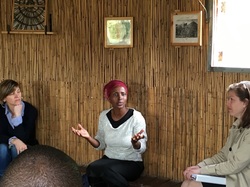 Those who mourn Blessed are they who mourn, for they shall be comforted. Reduced to tears by Yad Vashem, the Holocaust Museum, I began to get a deeper understanding of the grief felt by the Jewish people, and their existential sense of being under threat. The last room of the museum, where records of all those known to have lost their lives in the Holocaust are kept, left me speechless. A week later I could not help but be moved by the pain of the Palestinian family that I stayed with in Bethlehem, and of other Palestinians, who lived with loss every day. In creating a nation for Jewish people and then maintaining its safety, Israel’s security policies have meant loss and humiliation for Palestinians. These two competing griefs are at the heart of the conflict. I was deeply sympathetic to both and cannot see how each may be comforted. I hope they will. Ending my trip in the UK I did not realize I would experience my own grief, as my Grandfather passed away on my last full day in England. By some cosmic arrangement I was able to join my family in prayer, conversation and at dinner on that day. I found comfort in their presence. I pray for comfort for those who grieve in Israel and Palestine. The Meek Blessed are the meek, for they shall inherit the earth. We were humbly served by our guide and our guard. Yashai and Ruven (see picture below) were quiet and unassuming but made everything flow seamlessly. Yashai was balanced, gentle, informed and delightful. He was very popular with our whole group. It was sobering to need an armed guard and Ruven was slow to get to know people, but by the end of our trip he was a friend who had kept us safe and together. 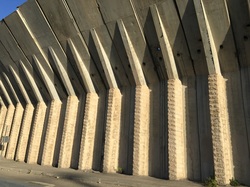 When thinking of the meek I also am reminded of the server at the American Colony bar who made me a drink one night. He was a Palestinian with a work permit, he avoided controversy but talked discreetly about the security situation. You may have heard in the news that it was the same night on which a bomb exploded in a bus in Jerusalem. Finally, my host in Bethlehem had a son who was living in Bethlehem and working three jobs in Jerusalem in order to support his wife and raise a son. As a Palestinian male he was not permitted to drive in Jerusalem and daily wrestled with living inside the ‘security barrier’ (see picture above and to the right) and navigating check points. I had a deep respect for his quiet dignity. These people all deserve the earth, or at least a homeland. 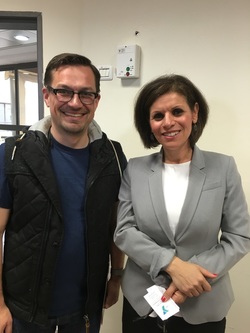 Those who hunger and thirst for righteousness Blessed are they who hunger and thirst for righteousness, for they shall be satisfied. After the formal tour ended I stayed on to get a contrasting experience, I stayed with Palestinian Christians in Bethlehem to experience life under occupation and I went to Hebron on a dual narrative tour, meeting with settlers and displaced Palestinians. I noted that there is a dark side to believing that your cause is righteous. Sometimes you are unable to see the dignity in other people and are willing to reduce them to the place of opponent. ‘Satisfaction’ for some of the settlers felt like a zero sum game, in which the Palestinians had to lose for them to win. I do not believe that this will lead to peace and it made me sad. Professor Dalia Fadila was quite simply a force of nature. She is the first female muslim president of any educational institution in Israel. Wrestling with traditional culture, expectations of male authority and the need to create excellent educational opportunities for young men and women in her school, Dr. Fadila was popular with our whole group. She has expectations and she is determined to fulfil them. She got the telephone number of at least four university leaders from the bay area desperate to work with her and help her satisfy her expectations. Below is a picture of Professor Dalia Fadila, the first female muslim president of an institution of higher learning in Israel. The Merciful Blessed are the merciful, for they shall obtain mercy. We met a colonel in the IDF (Israeli Defence Force). This may be a controversial paragraph in my letter, but I found him to have a sense of mercy. He was committed to the security of Israel, but had a sense that living under occupation was deeply problematic for Palestinians. He believed that Israel could take down the wall tomorrow and not suffer deterioration in its security. He also believed that the IDF had to try and live up to international expectations of ethical engagement whilst still creating a secure situation for Israel. Perhaps he was very good at public relations, perhaps in the middle of a military engagement he would not seem so merciful, particularly for a Palestinian under occupation. I pray for mercy in this whole region. My host in Bethlehem was another example of mercy. Whilst describing with excruciating honesty his experience of occupation, and at times being deeply critical of Israeli culture and actions (often describing these actions as harrassment), he was able to be complimentary to much that Israel has achieved as a nation in a short 67 years and described Israeli civil society as essentially just. I hope that this sense of justice soon extends to those under occupation, which is a blemish on the Israeli reputation. The Pure of Heart Blessed are the pure of heart, for they shall see God. Visiting the Hand in Hand School, an experiment in Arab Israeli side by side education, was a high point of my visit. It was pure in heart and intention and I loved it. Facing attack for its values by arsonists it remained deeply committed to bringing Jews, Christians and Muslims together in education. I could see God in them, I hope that they see God present in their endeavours. A student of the school runs in circles in front of our delegation in the picture below. I also want to comment on Abby Porth, one of the trip organizers. Some people have suggested that my trip was a propoganda tour, and anticipating that it would be from a predominantly Jewish perspective. Understanding this I planned my stay so that I could remain five days longer and make my own investigation into Bethlehem and Hebron without the tour leaders oversight. However, I really do believe that Abby has an open heart and a desire that we experience Israel, warts and all, and form our own opinions. My sense of her integrity grew as the trip unfolded. She was willing to share honestly and engage in painful criticism of the country she loves by participants on our tour who were wrestling with their own sense of this conflict. I wanted to note her passion and intentions and my gratitude for them. The other person I considered ‘pure in heart’ was my Palestinian hosts’ grandson. He was two and a half, and suspicious of me at first, but after a few magic tricks he took to me. We became firm friends! The Peacemakers Blessed are the peacemakers, for they shall be called children of God. Peacemakers are needed in Israel. The most powerful example I met was Eliyahu, an Orthodox Jew who is sympathetic to settlers but also a determined peace activist. Along with a Palestinian guide, he arranges the dual narrative tour of Hebron. He was clear about his own hopes for Israel whilst also being very sensetive to their impact on Palestinians. He was very willing to see multiple sides of the situation and I hope that his vision of peace takes hold in Israel. 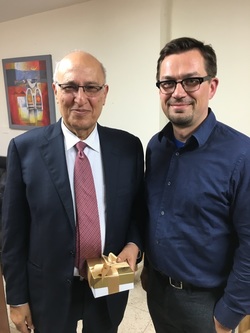 We also were priviledged to meet with both Shimon Peres, former Prime Minister and President of Israel, and Nabil Shaath (pictured right), one of the Oslo Accord negotiators and former Foreign Minister for the Palestinian Authority. This priviledge was possible because for a short time the Mayor of San Francisco came to Israel and our tour merged with his. We would not have warranted these opportunities without that. Listening to both men, they yearned for peace, and both believed a two state solution was the best way to get it. There was less agreement between their presentations on how to move from where they are, to where they might be. But I believe that if their intentions are to achieve peace there is a chance it might happen. I hope this isn’t wishful thinking. The Persecuted Blessed are they who are persecuted for the sake of righteousness, for theirs in the kingdom of heaven. Everyone feels persecuted in Israel and Palestine, and all of them believe that their cause is righteous. I wish it were possible to describe a way in which these competing visions for Israel could be harmonized into one new reality, but it is hard to see how. We were told when we got close to Hebron that our dual narrative tour would be an example of ‘competing victimology.’ Honestly, I believe that each side has experienced persecution, from terrorists, from the IDF, from an international community that seeks to impose flawed solutions. I hope that the people of Israel and Palestine might be able to find ways of seeing the suffering of the other, rather than just their own and that this might lead to empathy and peace. Israel/Palestine could look very much like the Kingdom of Heaven if this were to happen. Being a Disciple As I end my letter to you this month, I wanted to say that my own spiritual experience on this trip was powerful and personal. I never really wanted to go on a spiritual pilgrimage of the Holy Land because I was worried that I would find that people had built a church and a gift shop on every street corner where Jesus was ever supposed to have done anything. That was in fact what I found, but I agreed to this trip because it offered me a different lens on Israel and Palestine. I deeply appreciated seeing the political, security and social context of Israel. I loved the opportunity to gain access to conversations that many people are not able to have about this region. Going to Bethlehem and Hebron were also great priviledges. This was the trip of a lifetime. Our hosts also took us to many Christian holy sites and I found that indeed, a church and gift shop had been built everywhere that Jesus ever did anything. But I found that I didn’t mind it as much as I thought. What I found most moving was just how profound the words of Jesus were and are. His Beatitudes described ancient Palestine so well, with all its complex ideologies and competative victimologies. He was insightful, but also generous and held out a vision of hope for a future full of peace. As I sat and prayed on the supposed location of the Sermon on the Mount, my eyes filled with tears and I was grateful for my teacher. I found myself becoming more deeply committed to being his disciple. And I wonder if any of you would like to go back with me some time soon? Love, Matthew+ |
Matthew WoodwardFrom the UK, Matthew loved US culture from the first time he picked up a Fantastic Four Comic when he was 12. Archives
March 2020
Categoriesg |

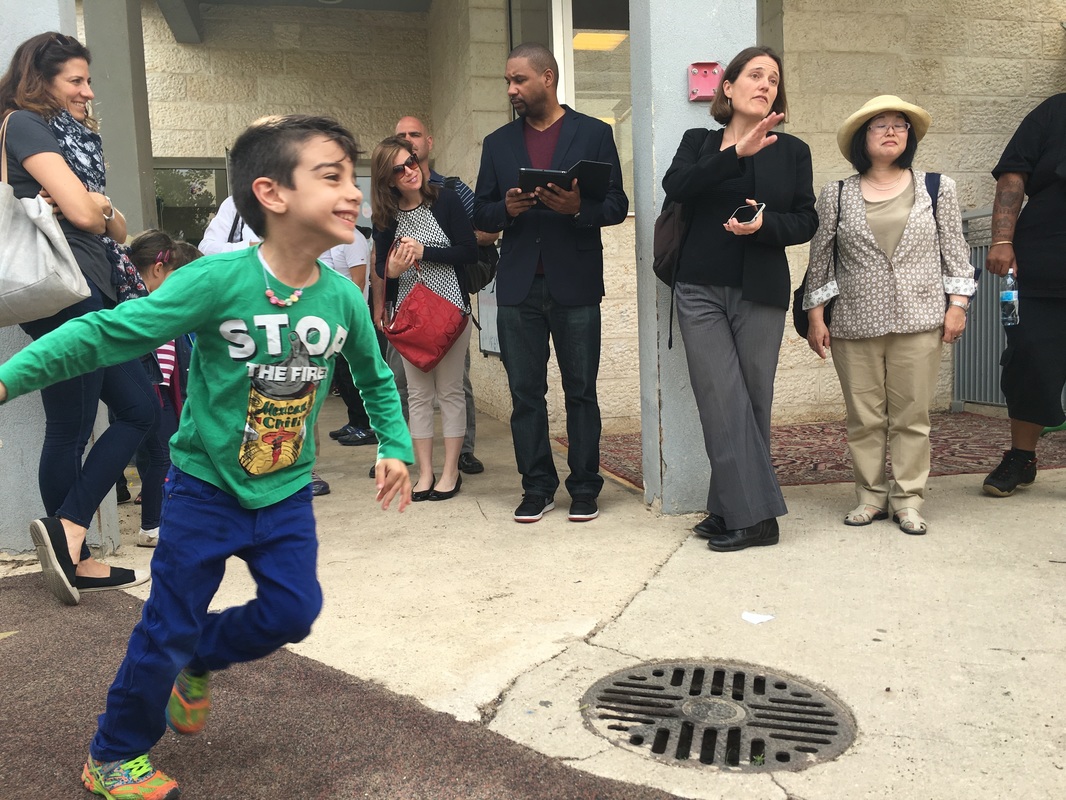
 RSS Feed
RSS Feed